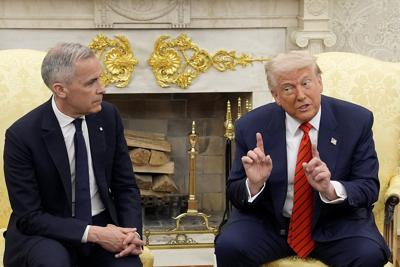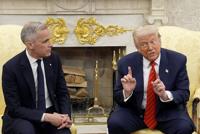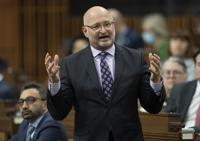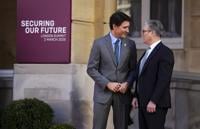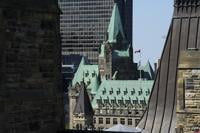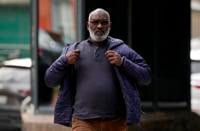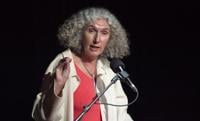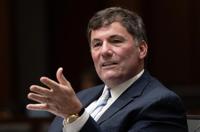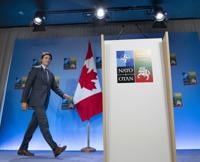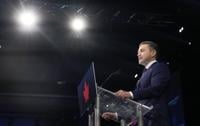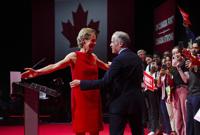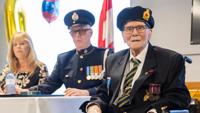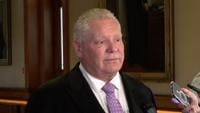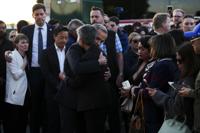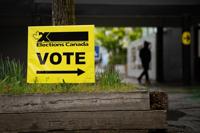OTTAWA - Canada's premiers and Prime Minister Mark Carney will meet in person in Saskatoon on June 2.
In a social media post, Carney said that in the face of "immediate trade pressures," he and the premiers are focused on building up Canada's economic resilience.
"That means launching big nation-building projects, removing internal trade barriers and building one ´ºÉ«Ö±²¥ economy," Carney wrote, adding that the meeting in Saskatoon will "keep that work going."
Carney spoke with the premiers on Wednesday afternoon to brief them on his first meeting with U.S. President Donald Trump.
Ontario Premier Doug Ford, who took part in the conference call on Wednesday, said the premiers congratulated the prime minister on both his election victory and the "restraint" he showed during his Tuesday meeting with Trump.
"I don't think I'd have the restraint that he had yesterday, to be very frank," said Ford. "I think it's a good start on a new relationship... I think everyone's feeling relatively good on the meeting yesterday. So that's a good start."
Carney briefed the premiers after Alberta Premier Danielle Smith publicly raised the prospect of her province separating from Canada.
Last week, Smith's United Conservative government introduced legislation that, if passed, would sharply reduce the bar petitioners need to meet to trigger a provincial referendum.
Ford said Carney did "a really good job" of reaching out to the West and that he told the prime minister it's time his government started "showing some love" to Saskatchewan and Alberta.
"The last prime minister showed no love," Ford said. "So it's nice that we're heading out there to Saskatchewan for (a first ministers') meeting."
When asked about Smith's referendum legislation during a press conference in Washington on Tuesday, Carney said Canada is stronger when the provinces work together.
"As an Albertan, I firmly believe that," he said. "You can always ask a question, but I know what I would respond clearly."
On Tuesday, Ford criticized talk of Alberta separating and said Canada must be united in its fight against the United States.
"This is a time to unite the country, not people saying, 'Oh, I'm leaving the country,'" he said.
Asked Wednesday if any premiers on the conference call cautioned Smith about the timing of a referendum, given the talk of annexation coming from the White House, Ford said "no one brought that up" but the subject might come up in "a private conversation."
Ford was also asked if federal Conservative Leader Pierre Poilievre had asked him for a meeting. He said he thinks Poilievre "asked everyone across the country for a meeting."
"I have no problem with that, and I'd be more than happy to talk to anyone and work with anyone," Ford said.
Ford said the premiers also talked about breaking down interprovincial trade barriers. While Carney has said his government would table legislation by July 1 to allow goods to travel across the country barrier-free, Ford said Wednesday that he wants the premiers to get together and sign memorandums of understanding.
"Even Danielle (Smith), we're texting back and forth, and she wants to sign an MOU too," Ford said.
Ford said Carney asked all the premiers to pass on their five priorities for large national infrastructure projects.
"We're fighting the tariffs and we just want to get projects moving forward as quickly as possible," Ford said.
Carney and Trump spent about two hours together Tuesday at the White House, including about half an hour in front of the cameras in the Oval Office.
It was their first face-to-face discussion of U.S.-Canada relations and Trump's ongoing trade war.
Manitoba Premier Wab Kinew sent Carney a letter Wednesday pitching federal-provincial partnership on several "nation-building" projects.
They include creating a trade corridor through the Port of Churchill, establishing Indigenous "fair trade zones" and developing critical minerals infrastructure. In his letter, Kinew called his province "the Costco of critical minerals."
Kinew said Manitoba "stands ready to collaborate" with the prime minister and other provinces and territories to "build a stronger Canada on projects of national interest."
In question period Wednesday, Kinew responded to a question about what he's doing to protect the province's film industry from U.S. tariffs.
"I raised this exact issue with the prime minister today, alongside the premiers of British Columbia and New Brunswick," Kinew said.
He said Carney and the premiers "have to protect industries across the board, but including those that generate intellectual property."
B.C. Premier David Eby said after the meeting Wednesday that the premiers agreed Carney succeeded in setting the tone for "a new relationship" between Canada and the U.S. He said the premiers were all "grateful" that the meeting went the way it did, given how recent meetings with other world leaders have gone in the Oval Office.
Eby also said British Columbians are "all in" for Canada and that this is the moment to stand together as a country.
"The idea of separating here is a non-starter," Eby said, adding that he encourages premiers to work together to hold the country together and push back against any separatist movement.
Carney said he and Trump agreed to talk further in the coming weeks and will meet in person again when the prime minister hosts the G7 leaders at a summit in Alberta from June 15 to 17.
"Really, today marked the end of the beginning of a process of the United States and Canada redefining that relationship of working together," Carney said.
"The question is how we will co-operate in the future. How we can build an economic and security relationship built on mutual respect, built on common interests, that delivers transformational benefits to our economies."
Fen Hampson, a Carleton University professor and co-chair of a group of experts on Canada-U.S. relations, said Carney has to manage a "two-track set" of negotiations with the U.S.
First, he faces coming negotiations on the Canada-U.S.-Mexico trade agreement. CUSMA is scheduled to be reviewed in 2026 but Trump has indicated he wants it reopened sooner.
Then there is the "more immediate" challenge of persuading Washington to lift recently imposed tariffs on ´ºÉ«Ö±²¥ exports, Hampson said.
"That's the first order of the day because I think he recognizes, our government recognizes, that you can't be renegotiating (a trade deal) when essentially the Americans have broken the back of the agreement with these very punitive tariffs," he said.
While Trump said Tuesday there was nothing Carney could say to get him to lift the tariffs immediately, Hampson said the president is "quite capable" of changing his mind.
"We've seen that before in many cases," he said. "We've even seen it with tariffs. He's imposed tariffs and then lowered them or delayed them."
Working in Canada's favour, Hampson said, is the fact that the American economy is "about to tank" as a result of tariffs imposed on Canada and other countries, including China. The challenge will be to get Trump to understand the importance of Canada's market, he added.
Carney is expected to name a new cabinet next week, ahead of the return of Parliament at the end of the month.
Hampson said he suspects the prime minister will be making some changes to his core team and that he's going to have to pick people who are "tough and good negotiators."
"As he looks to potential cabinet appointments, he really needs to look at them not just in terms of their management and ministerial skills, but in terms of their negotiating skills because they're going to have to do some of the negotiating."
— With files from Allison Jones in Toronto
This report by ´ºÉ«Ö±²¥was first published May 7, 2025.Â

